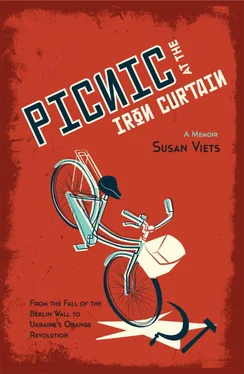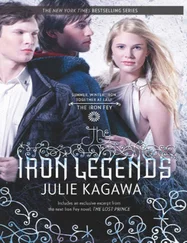I handed her my credit card and booked a non-refundable flight to Kiev.
At home, I panicked. Work deadlines loomed; I had not even formally requested time off.
“I won’t miss any of my deadlines,” I promised my boss the next day. He gave me permission to go.
I could not imagine being there and not reporting. I sent an email to the foreign news editor at the Sunday edition of my old newspaper, the Independent , and felt so excited when he replied and commissioned a feature. Signed on for Orange Revolution coverage, I telephoned Marta to let her know I would be leaving the next day.
“Stay with me,” she said. No invitation could have made me happier.
Men with gold teeth slumped on chairs in the Frankfurt Airport departure lounge. Seated first on the plane, I saw them totter down the aisle, then collapse into seats behind mine; the scent of alcohol — vodka, I thought — still lingered where they had passed. They tried to order another round before the flight took off. I checked my watch. It was 9:30 a.m. Time peeled back fourteen years.
I ate every item the flight attendants offered me, asked for seconds and worried about when food would next be available. I knew this was irrational, but the feeling was too urgent to ignore. Full for now, I reclined my seat. I thought of my father. I would land in Kiev on his birthday. His death ten years earlier triggered my decision to leave Ukraine, make my way home and abandon journalism.
I thought again of advice from my friend Roma. I had confided in her that I still fought wanderlust.
“Maybe it’s an addiction,” I said.
“Stop relying on external stimulation! Find it from within,” she insisted. I recognized the truth of this. I’d made progress but worried that my trip to Kiev might be a lapse and that I would be pulled back into my old life.
Marta met me at the airport. She had tied a small plastic orange strip to her bag and held roses in her hand, which she gave to me. We hugged.
“How great to see you,” I told her. “Just like 1991.”
“It’s so much better!” she said. “Even Yurko is interested in politics now. Wait until you see the square.”
Her apartment just about backed onto it. The din from protesters in the background when we spoke by phone had been so pronounced that I packed earplugs for both of us to help us with sleep.
Yurko, Marta’s driver, flew an orange ribbon from his car antenna. As we approached, a fellow orange supporter honked at him; he honked right back. The radio blared through Yurko’s rolled-up window glass. I heard the sound of Parliament in session. Once in the car, we honked our way through the parking lot, down the road and onto the Kiev-bound highway. “Even the border officer was nice,” I told Marta. “He smiled when he stamped my passport.”
Marta pointed out changes as we drove. Tall apartment buildings had sprouted by the highway. We flew past a large new supermarket, over a bridge that I knew well, the broad Dnipro coursing below. Yurko plotted a route that skirted closed roads. He found a back way into Marta’s courtyard. We heard chanting from protesters in Independence Square. We dropped our bags and then walked half a block into the centre of the Orange Revolution. I could not believe my eyes.
“I’ve never seen anything like this,” I shouted. Marta could not hear me. Rock bands played on stage. Their speakers blared. Cheers from fans filled all lulls. Marta and I linked arms and snaked our way through the crowd. I felt claustrophobic, remembering that sense of entrapment when Hungarian police in Budapest had appeared on motorcycles and fired tear gas during a demonstration.
Now, deep in this crowd, I could see no escape route. My view ahead was blocked by people’s backs. I looked up at the sky, the one place that was still an empty space. Then I looked down again and fought claustrophobia. Marta and I were swept along in a sea of people. We soon found ourselves in the centre of the square. We faced a huge stage festooned with orange decorations.
So many popular bands played. We were as excited to hear them as everyone else in the crowd. Other people wore orange hats, orange scarves, orange jackets and orange mittens. If they had no orange clothes, they wore orange garbage bags with holes cut out for their arms, or tied orange ribbons around their wrists, foreheads or necks. Young guys danced on dumpsters.
“It’s cool to be orange,” I think Marta shouted. Each syllable was a puff of steam.
I only really heard the word cool . At minus 7 degrees Celsius, she might have meant the weather. Smoke wafted up from fires in huge metal bins. People huddled around the bins with their hands stretched out. I felt ice and snow crunch underfoot. From the excited look on Marta’s face, I think I guessed right the first time, that she felt proud to see Ukrainians out in numbers like this.
We moved toward the street. I wanted to tell Marta how different this Ukraine was from the one that I had left, but she still could not hear me. I glanced over at tents that housed striking students. This tent city stretched down Khreshchatyk toward the Bessarabskyi Market and blocked all traffic. It seemed that half of Kiev filled the square. I remembered when students last camped here in 1990 and the one communications tool they had. It was that megaphone. Now digital cameras clicked and people swapped pictures and messages over cell phones. Ukraine had matured in many ways, but not in how it treated political opponents.
I was not prepared for the shock of seeing Victor Yushchenko. He came on stage to give a speech. He stood there, rigid. His face was ravaged. This punishment by poisoning — not yet proved but also doubted by no one — might even be worse than exile to the Gulag. I remembered what New York Marta, who still lived in Kiev, had told me. “Doctors inject painkillers into Yushchenko’s spine,” she said. “Every time he’s on TV we try to see if he’s getting better, but he still looks so bad.”
As I stood there and watched Yushchenko speak, I agreed. I admired his courage and stamina. He thanked people for coming to the square and addressed army officers. “My friends,” he said. He asked military men not to respond if the president declared a state of emergency and ordered the use of force. A student in front of me checked his phone. I saw his message. A contact sent him information on more pro-Yushchenko protests organized by students for the next day.
“How likely do you think it is there’ll be a crackdown?” I asked Marta. She told me about a turning point a few days before I arrived when a military officer spoke in the square in support of Yushchenko. She also said, “some of the officers’ wives and children are in the square. I don’t think they’ll shoot.”
We had come home and now sat on the sofa in Marta’s living room. I had been away for eight years, but her apartment still felt the same except for the sound of the window panes rattling from the noise in the square. The doorbell rang in the middle of our conversation. James arrived, then Stephen and finally Yaroslav. Time collapsed. All these friends from different periods, now scattered around the world, had come back to cover the protests. Everyone found a chair and worked.
James talked to his editor. Then he flipped through a magazine on Marta’s side table.
“I’m going to Crimea. Do you want to come?” Yaroslav asked me. I did not want to go. That life of chasing news stories had passed. I had only features to write and the luxury of time. Yaroslav, as action-oriented and sharp-witted as ever, quietly planned his next scoop.
Stephen had come from London. We gossiped about old colleagues. There was no awkwardness in that gap of time that had passed. These friendships felt unchanged. Later, after everyone had left, I rummaged through my suitcase and handed Marta a package of earplugs.
Читать дальше












